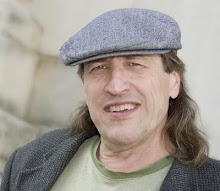Aug. 26, 1980
The water roars at the falls, a loud sound now that
evening’s rush hour with its parade of cars, trucks, buses and people has
trickled down with the end of the day.
Ben sits on the lip of a concrete block at the top of the
bank staring out at a band of orange on the water – a trick of light through
which ducks and geese float on their way to the shore to feed. Killies flee
before this fleet creating a ruckus on the surface their tiny silver shapes
catching bits of light as they move.
“There’s a man around here who once taught at Harvard,” Ben
says suddenly as if completing something he was thinking about for awhile.
“He’s a brilliant man, but not right in the head.”
Ben continues to stare out, but I realize he is no longer
seeing the river at all, but some vision of his own that clouds his eyes.
“He walks around here like a bum wearing an old green knit
cap from his days in the army,” Ben continues. “It’s the kind of cap we used to
put under our helmets to absorb the shock of shells bursting over us. His
clothes are always dirty and he stinks of sweat, vomit, and wine.”
Again, he pauses, as if each word brings him pain.
“I knew him a long time ago when the war was still ahead of
us, and our frivolous youth behind us. Some teachers I knew thought he was the
most brilliant man they’d ever met. I wasn’t one of them. He was always quoting
some radical like Thoreau, and mumbling about the middle class and where he
thought the country was heading. I half mocked him back then.”
A bird I do not see gives a cry from above us in the tree,
twisting Ben’s attention in that direction, as a small gull emerges from behind
the greenery, continuing its cry high into the air. We both watch it merge with
the pale sky.
“He’s name is Leo,” Ben said. “Every bank teller in the
county knows him. People say he’s rich and a lot of young people hang around
him for that reason.”
Ben pulls out his pipe, stuffs it, lights it, and then puffs
slowly. His face has new wrinkles, but these are not from age, but from perhaps
rage, altering the landscape of his cheeks and forehead the way a stone cast
into still water alters the surface with new ripples.
The wind picks up and we see the gull reappear and we watch
it as it dives down into the surface of the water and comes up with a squirming
silver fish which it swallows whole.
The river has an ash color now, reflecting a cloud-veiled
sun and the moving shape of the gull.
“Those people use him because he doesn’t have any other
friends,” Ben mumbles, then stares back into the water where the ducks and
geese feed with a bit more dignity, and the water roars behind them over the
small falls, ash color turning to gold as the sun finally manages to make its
way out of the clouds. But the light does not shine on clean water. Instead, it
only reveals the filth the river normally hides, the bottles and the debris
that never wash clean, no matter how hard it rains.










No comments:
Post a Comment